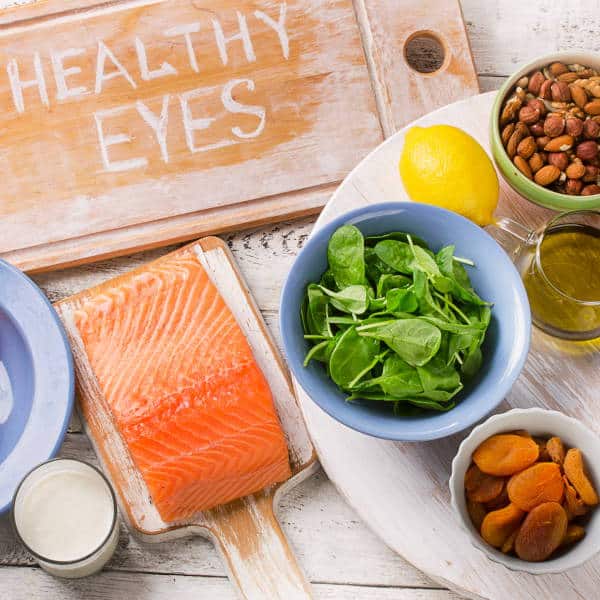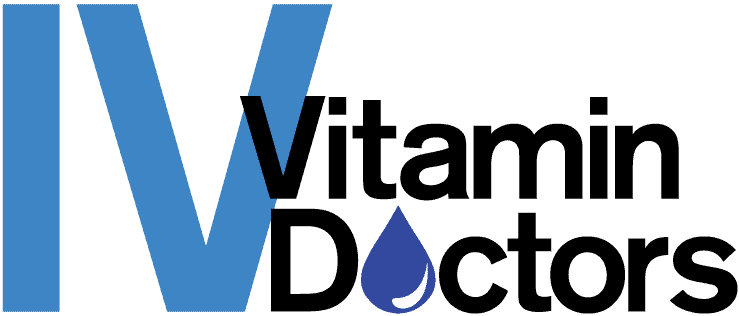Is there a connection between overall wellness and healthy eyes?
Yes, maintaining a healthy lifestyle will go a long way toward keeping your eyes healthy. Eating a balanced diet and staying active can lower your risk of disease, which can lead to vision problems.
Medical conditions, such as diabetic retinopathy, age-related macular degeneration, glaucoma, and cataracts directly impact vision. Though a variety of different factors cause these eye diseases, nutrition seems to have an influence on all of them – at least in part.
“As individuals, our bodies age differently from each other,” says Johns Hopkins ophthalmologist Albert Jun, M.D., Ph.D. “However, an abundance of evidence indicates that keeping yourself in good health as you age decreases the occurrence or effects of age-associated eye problems.”
What are the best foods for eye health?
The best vitamins for the eyes are found in a balanced meal plan that includes:
Vitamin A
Eating food rich in vitamin A (leafy greens, tropical fruits, carrots, leafy vegetables, winter squashes, dried apricots, bell peppers, cantaloupe, fish, and liver) can improve eyesight and support eye health. Vitamin A maintains the eye’s supply of rhodopsin — a pigment that helps us see at night.

Vitamin A deficiency can cause xerophthalmia, a constellation of ocular signs and symptoms that damage the cornea of the eye. Xerophthalmia is a major problem in developing countries and is a leading cause of preventable blindness.
According to the Mayo Clinic, vitamin A is a powerful antioxidant. Harvard Health explains that antioxidants help slow or reverse oxidative stress (high level of free radicals) that damage cells and their DNA (genetic material), which plays a role in many age-related conditions.
B Vitamins
A deficiency in certain B vitamins can lead to many problems, including poor vision. One study found a link between a reduced intake of vitamin B3 (niacin) and glaucoma (increased pressure in the eye that damages the optic nerve). Over time, optic nerve damage causes vision loss.
B vitamins can also act to alleviate the symptoms of certain eye conditions, such as dry eye syndrome. Dry eye syndrome is a common condition that occurs when the eyes don’t produce enough tears for lubrication, or the tear quality is inadequate. Dry eye increases with age and is more commonly found in post-menopausal women.
In a 2020 study, a combination of vitamin B12 and artificial tears improved symptoms of dry eye syndrome. According to the researchers, vitamin B12 may repair the corneal nerve layer or the nerves on the eye’s outer surface. This can help reduce the burning associated with dry eye.
Vitamin C
Vitamin C supports healthy blood vessels, decreases the risk of cataracts, and absorbs the iron the eye needs to function properly.
Vitamin C is essential for the production of collagen. Collagen is the most abundant protein in the body. It is a component of connective tissue, the supportive matrix found in the organs of the body. It is found in skin, muscles, bones, and blood vessels.
Citrus fruits like oranges, grapefruits, lemons, limes, and kiwis are high in vitamin C, as are vegetables like sweet potatoes, green peppers, and broccoli.
Vitamin E
Vitamin E is a potent antioxidant that helps protect the eye from damage by free radicals.
According to the American Academy of Ophthalmology, Vitamin E may help reduce the risk of macular degeneration, cataracts, and dry eye—especially when you take it along with vitamins C and E, beta-carotene (converted to Vitamin A in your body), zinc, and copper.
Foods rich in vitamin E include spinach, broccoli, avocado, and sunflower seeds.
Lutein and zeaxanthin
Lutein and zeaxanthin are two important carotenoids — yellow, orange, or red pigments — found in the retina. Both are key to improving eyesight. These carotenoids help protect the macula (center of the retina) by improving pigment density in that part of the eye and absorbing ultraviolet blue light.
Studies have shown that foods high in lutein and zeaxanthin decrease the risk of age-related macular degeneration (AMD); AMD is the leading cause of vision loss for older adults.
A daily dose of both can be found in broccoli, spinach, kale, corn, orange peppers, kiwi, grapes, orange juice, zucchini, squash, and eggs.
Zinc
This essential mineral plays a vital role in transporting vitamin A from the liver to the retina where it can produce melanin — a protective pigment in the eye. Zinc deficiency has been linked to poor night vision and cataracts.
Dietary sources of zinc are red meat, oysters and other shellfish, nuts, and seeds
Omega-3 fatty acids
Omega-3 fatty acids are important for proper visual development and retinal function. They help reduce inflammation, enhance tear production, and support the eye’s oily outer layer. It’s found in fish oil from sources like salmon, tuna, and halibut.
Purchase Any 4 IV's
Or Injections & Get The 5th Complimentary
Call +1-877-760-3564
Or Click Here to Send Us Email

What are the most important vitamins to slow the progression of AMD?
The National Eye Institute (NEI) recently updated its guidelines for AMD in a study called AREDS2 (Age Related Disease Study). The best vitamins for macular degeneration – when given in high concentrations — slow the progression of the disease in a large percentage of people. These vitamins include:
- 50 milligrams vitamin C
- 400 IU vitamin E
- 2 milligrams copper
- 80 milligrams zinc
- 10 milligrams lutein
- 2 milligrams of zeaxanthin
How do I protect my eyes?
While good nutrition can maintain healthy vision, it’s also important to protect the eyes from outside disturbances.
Yearly eye exam
If you are 50 or older, visit your optometrist for a regular eye exam every year. The exam should include a dilated eye exam to detect age-related diseases at their early stages.
Yearly tests monitor any changes in your vision such as worsening near- or farsightedness and astigmatism (the front surface of the eye or the lens inside the eye is curved differently in one direction than the other).

Protect your eyes from the sun
It’s important to take daily precautions against overexposure to ultraviolet rays from the sun. Protect your eyes from the sun by wearing sunglasses, even on cloudy days. Be sure to choose sunglasses that block 99 to 100% of both UVA and UVB radiation.
Protect your eyes during physical activity
Wear protective eyewear like goggles and safety glasses. Protect your eyes during physical activities, like playing sports, doing construction work, or doing home repairs. Most eye care providers and sporting goods stores carry these products.
Protect yourself from digital eyestrain
LEDs (light-emitting diodes) are energy-efficient and cost-effective. But LEDs produce short-wave, high-energy blue light which has been linked to biological disturbances and sleep problems.
Extended exposure to blue light from computer screens, TVs, and other digital devices leads to eyestrain. Protecting your eyes from screens means giving your eyes a rest by taking a break from the screen every 20 minutes and looking at something else about 20 feet away for about 20 seconds.
Take time away from the screen and head outdoors. Your eyes will thank you for it.
Protect yourself from an eye infection
If you wear contacts, wash your hands before you put your contact lenses in or take them out to prevent infections. Be sure to disinfect your contact lenses and replace them regularly.
How important is IV vitamin therapy for vision improvement?
A busy schedule that includes work, family, and exercise, makes it challenging to maintain a diet with enough vitamins to improve vision. That’s why IV Vitamin Therapy provides IV infusions with the best vitamins for eye health.
Food and vitamin supplements must pass through the digestive system for absorption into the body. The administration of vitamins and minerals via IV therapy bypasses the digestive system and the nutrients enter the bloodstream immediately. This is the most effective and efficient way to realize their full benefit.
In one 20-to-60-minute session, Dr. Nazarian and his professional staff administer high dosages of vitamins and minerals scientifically proven to help improve and maintain eye health. Side effects are rare and may include bruising or redness at the injection site, bleeding, or infection, as is standard for any medical procedure that involves an injection.
Why choose IV Vitamin Therapy for vision improvement vitamins?
Dr. David Nazarian is board certified in internal medicine and highly trained in the field of traditional and alternative medicine. He has been utilizing IV fluids and vitamin replacement therapies in conjunction with other treatment modalities to treat a variety of medical illnesses and conditions for over 10 years.
With our years of medical experience and strict safety and sterilization practices, you’re guaranteed a personalized and safe IV vitamin therapy experience. If you’ve had IV vitamin treatments at other clinics, you will recongize the improved experience at IV Vitamin Therapy.
Where can I get IV vitamin therapy near me?
Busy? Our mobile IV therapy will come to you. Many of our clients who prefer to receive injections in the privacy of a home, hotel room, or office can choose our popular concierge house call service for mobile IV.
Call 855-999-5577 today or schedule your first appointment online!
IV Vitamin Therapy is conveniently located in Beverly Hills and can provide IV services come to your home, hotel room, or office throughout the Los Angeles area. We serve patients near Beverly Hills, Bel Air, West Hollywood, Santa Monica, West Los Angeles, Culver City, Hollywood, Venice, Marina del Rey, Malibu, Manhattan Beach, Redondo Beach, Downtown Los Angeles, Encino, Woodland Hills, Sherman Oaks, Calabasas, Burbank, Glendale, Hidden Hills, Agoura Hills, Northridge, North Hollywood, Topanga, Canoga Park, Reseda, Valley Glen, Chatsworth, West Hills, Orange County, Winnetka, Universal City, Silverlake, and Echo Park.
Purchase Any 4 IV's
Or Injections & Get The 5th Complimentary
Call +1-877-760-3564
Or Click Here to Send Us Email


